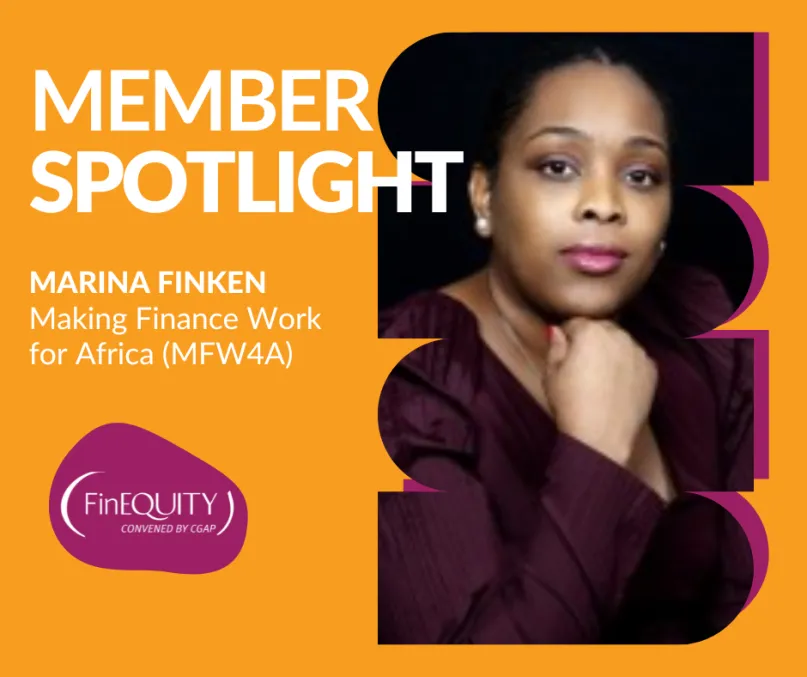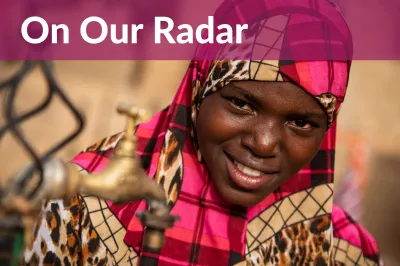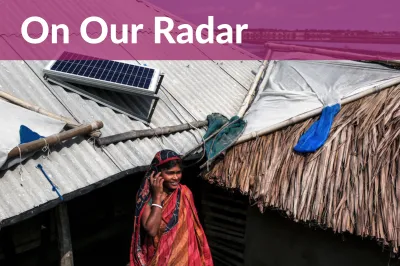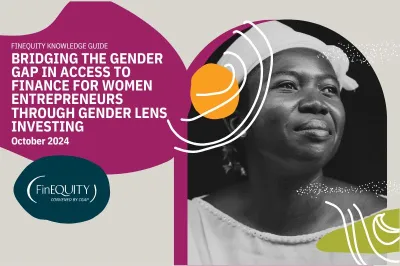Member Spotlight: Marina Finken

FinEquity: Tell us a little bit about yourself?
Marina Finken: My name is Marina Finken. I am the Head of the Making Finance Work for Africa (MFW4A) initiative at the African Development Bank (AfDB). MFW4A is a unique member-based platform for African governments, the private sector and development partners to coordinate financial sector development interventions in Africa. It serves as a reference platform for advocacy, knowledge sharing and cooperation on financial sector development on the continent.
Based in Abidjan, Côte d’Ivoire, the MFW4A secretariat is dedicated to developing robust financial systems that can effectively respond to Africa’s most pressing challenges, including poverty, gender inequality, climate change and youth unemployment. MFW4A operates as an independent entity supported by various institutions including AfreximBank, the European Investment Bank, and the TCX Fund, reflecting a robust coalition focused on fostering economic growth and resilience in Africa.
I was born in Yaoundé, Cameroun, lived in Cotonou, Benin as a teenager and later moved to France to further my education.
FinEquity: What's something about yourself that might surprise most people?
Marina Finken: Surprisingly, I only learnt how to ride a bicycle when I had my own children. For some reason, I had never learnt how to ride as a child, but I finally decided to in my 30s. My husband kept encouraging me, and eventually I grabbed the opportunity when he was teaching one of our daughters. That was a very proud moment for me. Now I ride with (almost) confidence. I strongly believe it is never too late for anyone to learn a new skill.
FinEquity: What originally drew you to the women’s financial inclusion and economic empowerment sector? What has kept you here?
Marina Finken: Before joining MFW4A, I worked as an accounting professional for 12 years in France, providing audit and advisory support to large banks and several financial institutions. I specialized in financial sector regulations, financial reporting and capital markets, however, my passion was in sustainable and development finance; especially using finance to address social and economic challenges in Africa.
I have always been drawn to the private sector and the role it plays in advancing economic development, especially as it relates to improving African livelihoods. When the opportunity came to contribute my skills in this area, I left my auditing career and joined MFW4A. I wanted to support in building deeper, innovative and stable financial systems that could effectively respond to Africa’s most pressing challenges, including poverty, gender inequality, climate change and youth unemployment.
The financial sector is key to Africa’s development. Advancing financial sector development in Africa requires collaboration between African governments, development partners, the financial sector and other stakeholders. These are the convictions which led to the creation of MFW4A more than 10 years ago. I too share the same vision and that is why I am here today.
FinEquity: Any current projects you’re working on/or recently worked on that you find particularly exciting/engaging?
Marina Finken: MFW4A has identified essential features to facilitate the catalytic role of financial systems on African economies and livelihoods. These features are captured in our vision, “Deeper, innovative and stable African financial systems capable of improving people’s livelihoods, supporting a green transition, and driving inclusive development on the continent”.
Therefore, our current strategy pursues four main industry outcomes which are being implemented through our four pillars of engagement;
- Inclusive and alternative finance
Scaling up affordable, responsible and accessible financial services that meet the needs of the underserved, including women, youth and rural households, and MSMEs; - Banking systems and sustainable finance
Fostering sound, vibrant and stable African banking systems aligned with international standards and sustainable practices, that are able increase capital flows to finance sustainable economies. - Trade finance
Scaling up finance for domestic and intra-African trade, and to support international trade with Africa - Long-term Finance
Countries develop deep, liquid, domestic financial markets that contribute to financing productive and sustainable investments in a country’s real economy, and to support a green transition.
We recently concluded the Africa ESG Forum, which we co-hosted with the African Development Bank. Delivered under the theme, Building a Sustainable Finance Ecosystem for Africa: A Collaborative Approach for ESG Disclosure, the event focused on building a sustainable finance ecosystem through collaboration on environmental, social, and governance (ESG) disclosure. The forum sought to catalyze collaboration and knowledge sharing on ESG issues, paving the way for the establishment of a centralized Africa ESG Information Disclosure Hub, and embedding ESG principles into the continent's development strategies. Participants at the forum envisioned the proposed African ESG Hub as a unifying vehicle for sustainability issues in Africa, enhancing awareness among local entities and international investors.
Although ESG Frameworks are so often viewed as a constraint, I strongly believe they present great opportunities for Africa. ESG frameworks reflect the expectations we have for companies to think about the impact their activities have on society, to create value not only for shareholders, but for all stakeholders. At MFW4A we recognize the importance of incorporating environmental, social, and governance (ESG) factors across all financial transactions. We are committed to fostering innovations that unlock new investment opportunities in green finance, climate resilience focusing on the intersection between climate and gender. This is Making Finance Work for Africa, and we look forward to deepening our work in this area with our partners.
FinEquity: What are your top priorities for the remainder of 2024 (and beyond) for your work?
Marina Finken: Diversifying our membership with a focus on African institutions continues to be a key priority. As collaboration and partnership are key values for MFW4A, we aim to broaden our membership base and increase our engagement with African based institutions, especially the private sector. While doing so, we will also reflect on how to enhance our products and services to our stakeholders. We want to expand our membership to financial institutions across sub-Saharan Africa, placing them at the forefront of impactful initiatives to unlock private finance for the region, while embedding gender considerations as a fundamental, cross-cutting priority.
As the African macroeconomic environment continues to evolve, being shaped by multiple global forces, the role of the financial sector is becoming even more important. Despite the progress witnessed over the years, the challenges are still numerous. Key among them is a growing population, unemployment, climate change and persistent gender inequality. As such, MFW4A must also evolve to help facilitate the catalytic role of the financial sector and strengthen its impact on African economies and livelihoods. This will be our priority for the coming years.
FinEquity: What can our members connect with you about/what can they ask you about?
Marina Finken: Members can connect with me to collaborate, build synergies and find consensus on financial sector development issues.
FinEquity: What role does FinEquity play in your work? Where do you see value in this community? How has being a member shaped your work?
Marina Finken: Bringing a gender lens to our programs and initiatives. We know that the development issues we want to address through finance, whether climate change, youth unemployment, poverty are not gender agnostic. As thus, gender is an important cross-cutting area of focus. Being part of FinEquity helps us mainstream gender into our work and gather evidence and insights to make Finance work for African women as well.


